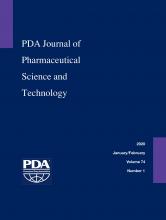Abstract
A one-year study to establish the container closure integrity (CCI) performance landscape of systems comprising rubber stoppers and glass vials was performed. Focus was on addressing the issues of CCI performance versus: (a) time, (b) compression levels and residual seal force (RSF) values, and (c) potential variation in results based upon the deterministic measurement method (tracer gas and frequency modulated spectroscopy). To reduce sample size to a manageable number, the study was based upon a design of experiments that considered a range of: (a) stopper formulations, sizes, and configurations; (b) vial sizes, types, and suppliers; and (c) compression levels. All systems showed good performance; there was no decrease in CCI with time, highlighting the general robustness of rubber–glass vial systems. Lower compression/RSF values tended to give slightly lower performance and wider scatter in data and thus should not be recommended for commercial applications. A small amount of oxygen exchange through the stoppers was observed for all systems—to be expected because rubber is known to be gas permeable. Consistent with models, RSF values decreased initially and then remained constant. Results are consistent with the literature.
- Container closure integrity
- CCI
- Vial system
- Leak rate
- Residual seal force
- Tracer gas leak detection
- Frequency modulated spectroscopy
- Gas permeability
- © PDA, Inc. 2020
PDA members receive access to all articles published in the current year and previous volume year. Institutional subscribers received access to all content. Log in below to receive access to this article if you are either of these.
If you are neither or you are a PDA member trying to access an article outside of your membership license, then you must purchase access to this article (below). If you do not have a username or password for JPST, you will be required to create an account prior to purchasing.
Full issue PDFs are for PDA members only.
Note to pda.org users
The PDA and PDA bookstore websites (www.pda.org and www.pda.org/bookstore) are separate websites from the PDA JPST website. When you first join PDA, your initial UserID and Password are sent to HighWirePress to create your PDA JPST account. Subsequent UserrID and Password changes required at the PDA websites will not pass on to PDA JPST and vice versa. If you forget your PDA JPST UserID and/or Password, you can request help to retrieve UserID and reset Password below.






